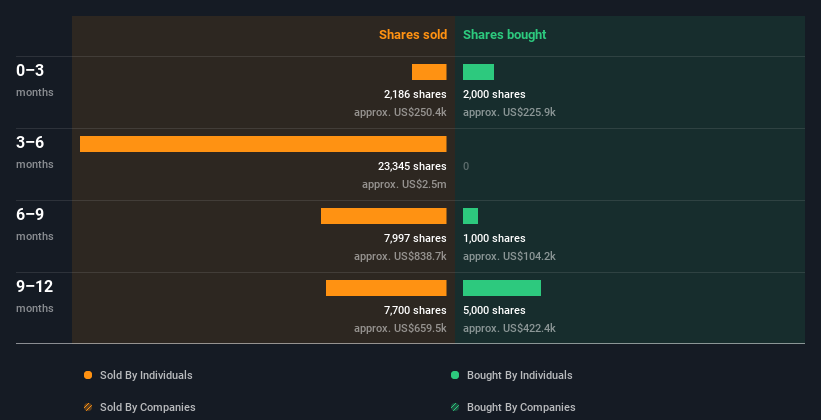Post Holdings Insiders Sold US$4.2m Of Shares Suggesting Hesitancy
In the last year, many Post Holdings, Inc. (NYSE:POST) insiders sold a substantial stake in the company which may have sparked shareholders' attention. When evaluating insider transactions, knowing whether insiders are buying is usually more beneficial than knowing whether they are selling, as the latter can be open to many interpretations. However, when multiple insiders sell stock over a specific duration, shareholders should take notice as that could possibly be a red flag.
While we would never suggest that investors should base their decisions solely on what the directors of a company have been doing, we would consider it foolish to ignore insider transactions altogether.
View our latest analysis for Post Holdings
The Last 12 Months Of Insider Transactions At Post Holdings
The Independent Director, Robert Grote, made the biggest insider sale in the last 12 months. That single transaction was for US$1.8m worth of shares at a price of US$105 each. That means that even when the share price was below the current price of US$116, an insider wanted to cash in some shares. When an insider sells below the current price, it suggests that they considered that lower price to be fair. That makes us wonder what they think of the (higher) recent valuation. While insider selling is not a positive sign, we can't be sure if it does mean insiders think the shares are fully valued, so it's only a weak sign. It is worth noting that this sale was 86% of Robert Grote's holding.
Over the last year we saw more insider selling of Post Holdings shares, than buying. The sellers received a price of around US$102, on average. It's not particularly great to see insiders were selling shares at below recent prices. Since insiders sell for many reasons, we wouldn't put too much weight on it. You can see a visual depiction of insider transactions (by companies and individuals) over the last 12 months, below. If you click on the chart, you can see all the individual transactions, including the share price, individual, and the date!

If you are like me, then you will not want to miss this free list of small cap stocks that are not only being bought by insiders but also have attractive valuations.
Post Holdings Insiders Are Selling The Stock
The last three months saw some Post Holdings insider selling. US$248k worth of shares were sold by insiders. But at least we saw US$226k worth of buying. While it's not great to see insider selling, the net amount sold isn't enough for us to want to read anything into it.
Does Post Holdings Boast High Insider Ownership?
For a common shareholder, it is worth checking how many shares are held by company insiders. A high insider ownership often makes company leadership more mindful of shareholder interests. It's great to see that Post Holdings insiders own 10% of the company, worth about US$708m. This kind of significant ownership by insiders does generally increase the chance that the company is run in the interest of all shareholders.
What Might The Insider Transactions At Post Holdings Tell Us?
Insider selling has just outweighed insider buying in the last three months. But the difference isn't enough to have us worried. It's heartening that insiders own plenty of stock, but we'd like to see more insider buying, since the last year of Post Holdings insider transactions don't fill us with confidence. While it's good to be aware of what's going on with the insider's ownership and transactions, we make sure to also consider what risks are facing a stock before making any investment decision. Case in point: We've spotted 1 warning sign for Post Holdings you should be aware of.
If you would prefer to check out another company -- one with potentially superior financials -- then do not miss this free list of interesting companies, that have HIGH return on equity and low debt.
For the purposes of this article, insiders are those individuals who report their transactions to the relevant regulatory body. We currently account for open market transactions and private dispositions of direct interests only, but not derivative transactions or indirect interests.
Have feedback on this article? Concerned about the content? Get in touch with us directly. Alternatively, email editorial-team (at) simplywallst.com.
This article by Simply Wall St is general in nature. We provide commentary based on historical data and analyst forecasts only using an unbiased methodology and our articles are not intended to be financial advice. It does not constitute a recommendation to buy or sell any stock, and does not take account of your objectives, or your financial situation. We aim to bring you long-term focused analysis driven by fundamental data. Note that our analysis may not factor in the latest price-sensitive company announcements or qualitative material. Simply Wall St has no position in any stocks mentioned.
 Index Options
Index Options CME Group
CME Group Nasdaq
Nasdaq Cboe
Cboe TradingView
TradingView Wall Street Journal
Wall Street Journal